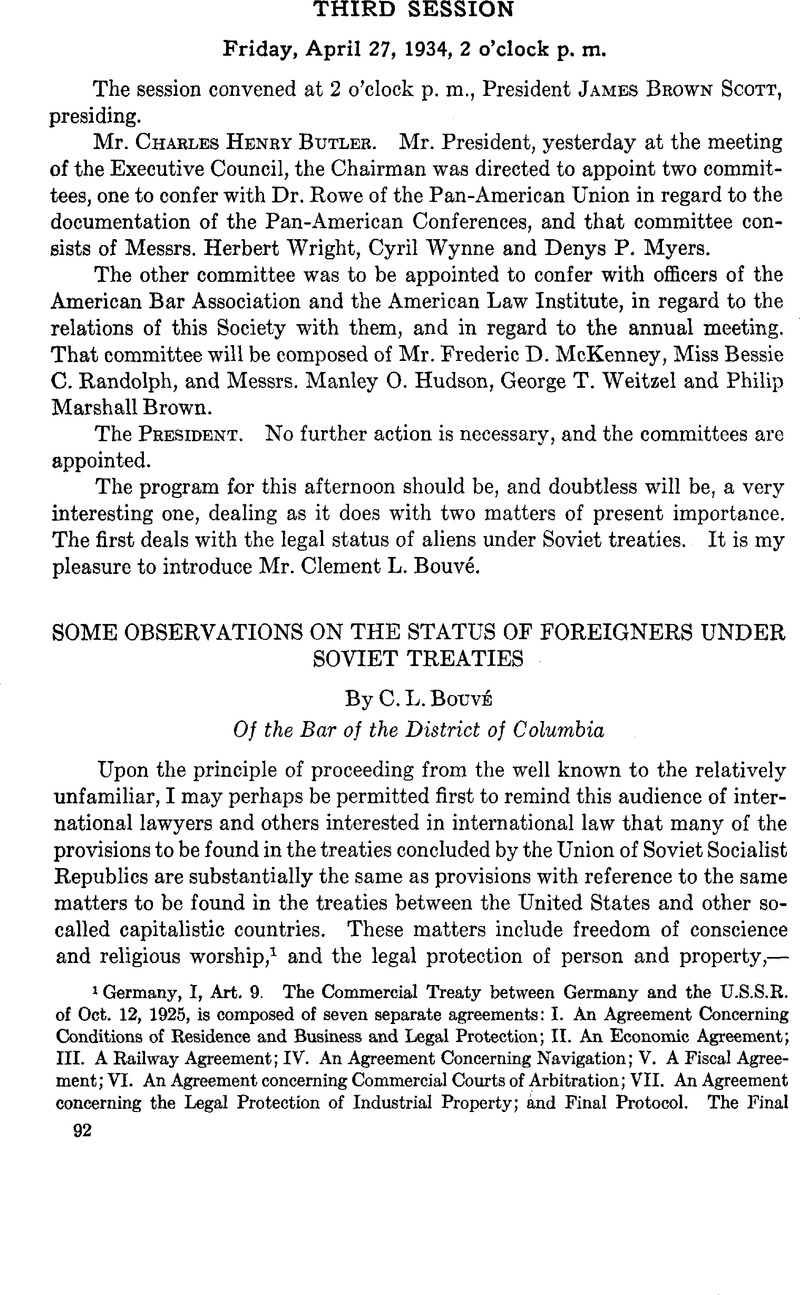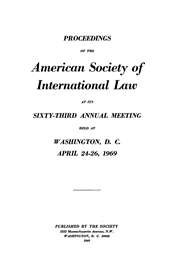No CrossRef data available.
Article contents
Some Observations on the Status of Foreigners Under Soviet Treaties
Published online by Cambridge University Press: 27 February 2017
Abstract

- Type
- Third Session
- Information
- Proceedings of the American Society of International Law at its annual meeting (1921-1969) , Volume 28 , 1934 , pp. 92 - 105
- Copyright
- Copyright © American Society of International Law 1934
References
1 Germany, I, Art. 9. The Commercial Treaty between Germany and the U.S.S.R. of Oct. 12, 1925, is composed of seven separate agreements: I. An Agreement Concerning Conditions of Residence and Business and Legal Protection; II. An Economic Agreement; III. A Railway Agreement; IV. An Agreement Concerning Navigation; V. A Fiscal Agreement; VI. An Agreement concerning Commercial Courts of Arbitration; VII. An Agreement concerning the Legal Protection of Industrial Property; and Final Protocol. The Final Protocol contains additional articles appended to each separate article of the agreement, each one of which is here designated Ad Art. A German Memorial was published by the Reichstag containing comments on the articles of the above agreements and the Consular Agreement of the same date.
2 Italy, Feb. 7,1924, Art. 5 ; Norway, Dec. 15,1925, Art. 11 ; Latvia, June 2,1927, Art. 2 ; Estonia, May 17,1929, Arts. 4, 5, 12; Sweden, March 5, 1924, Art. 2; Iceland, May 25, 1927; Germany, I, Art. 10, Ad Art. 10, Oct. 12, 1925.
3 Great Britain, May 16, 1921, Art. 6, and April 16, 1930, Art. 1; Norway, Dec. 15, 1925, Art. 3; Latvia, June 2, 1927, Art. 2; Italy, Feb. 7, 1924, Arts. 4, 5; Czechoslovakia, June 5, 1922, Arts. 9, 11; Iceland, exchange of notes, May 25, 1927; Estonia, May 17, 1929, Art. 4; Austria, Dec. 7, 1921, Art. 8; Japan, Jan. 20, 1925, Art. 4; Denmark, April 23, 1923, Art. 4; Sweden, March 15,1924, Art. 2; Germany, I, Art. 2, Ad Art. 2.
4 Italy, Feb. 7, 1924, Art, 4; Latvia, June 2, 1927, Art. 2; Great Britain, May 16, 1921, Art. 4; Denmark, April 23,1923, Art. 4; Norway, Dec. 15,1925, Arts. 2, 3, 8; Sweden, March 15,1924, Art. 2; Germany, I, Art. 1, Ad Art. 1; Japan, Jan. 20,1925, Art. 4; Czechoslovakia, June 5, 1922, Art. 12; Estonia, May 17, 1929, Art. 1.
5 Italy, Feb. 7,1924, Arts. 5, 8; Latvia, June 2, 1927, Art. 2; Germany, I, Art. 2, Ad Art. 2; Denmark, April 23,1923, Art. 4; Estonia, May 17,1929, Art. 1; Norway, Dec. 15, 1925, Arts. 2, 3; Japan, Jan. 20,1925, Art. 4; Sweden, March 15,1924, Art. 2.
6 “and to belong or not to belong to trade unions or similar trade organizations.” Germany, I, Art. 3, Ad Art. 3; and see Austria, Dec. 7, 1921, Art. 6; Italy, Feb. 7, 1924, Art. 10; Czechoslovakia, June 5, 1922, Art. 19; Norway, Dec. 15, 1925, Arts. 3, 9.
7 See particularly Germany, Oct. 12, 1925, 1, Art. 4, Ad Art. 4.
8 Germany, Oct. 12, 1925, 1, Art. 5, Ad Art. 5; Italy, Feb. 7, 1924, Art. 13; Estonia, May 17, 1929, Art. 3; Latvia, June 2, 1927, Art. 2.
9 Estonia, May 17,1929, Art. 11; Turkey, March 16, 1921, Art. 10; Sweden, March 15, 1924, Art. 2; Germany, Oct. 12, 1925, 1, Art. 7, Ad Art. 7; Denmark, April 23, 1923, Art. 4; Norway, Dec. 15, 1925, Art. 7; Italy, Feb. 7, 1924, Art. 6.
10 Italy, Feb. 7, 1927, Art. 6; Czechoslovakia, June 5, 1922, Art. 18; Great Britain, May 16, 1921, Arts. 4, 11; Denmark, April 23, 1923, Art. 4; Germany, Oct. 12, 1925, I, Arts. 7, 8, Ad Arts. 7, 8; Sweden, March 15, 1924, Art. 2; Estonia, May 17, 1929, Art. 3; Norway, Dec. 15, 1925, Arts. 7, 9.
11 Germany, Oct. 12, 1925, 1, Art. 15, Ad Art. 15; Estonia, May 17, 1929, Art. 8.
12 Estonia, May 17, 1929, Art. 12; Germany, I, Art. 16; Italy, Feb. 7, 1924, Arts. 9, 10; Latvia, June 2, 1927, Art. 2; Norway, Dec. 15, 1925, Art. 5; Sweden, March 15, 1924, Art. 2; Great Britain, April 16, 1930, Art. 1; Iceland, exchange of notes, May 25, 1927.
13 Germany, Oct. 12, 1925, I, Arts. 16, 17.
14 See treaty with Germany, Oct. 12, 1925, 1, Art. 18, and Ad Art. 18.
15 Germany, Oct. 12, 1925, V, Art. 1, Ad Art. 1; Latvia, June 2, 1927, Art. 2; Italy, Feb. 7, 1924, Arts. 6, 8; Sweden, March 15, 1924, Art. 2; Estonia, May 17, 1929, Arts. 3, 10, 12; Norway, Dec. 15, 1925, Arts. 5, 6.
16 Germany, Oct. 12, 1925, IV, Art. 1, Ad Art. 1; Austria, Dec. 7, 1921, Art. 9; Italy, Feb. 7, 1924, Art. 21; Great Britain, March 16, 1921, Art. 2; Iceland, exchange of notes, May 25, 1927; Latvia, June 2, 1927, Art. 2; Denmark, April 23, 1923, Art. 7; Norway, Dec. 15, 1925, Art. 18; Sweden, March 15, 1924, Art. 4.
17 See Germany, Oct. 12, 1925, VII, Arts. 1-7, Ad Arts. 1, 5; Norway, Feb. 24, 1928; Sweden, exchange of notes, July 21, 1926; Estonia, March 3, 1928.
18 Art. 14 of the treaty with Austria of Dec. 7, 1921, provides that “the delegations of the contracting parties and persons employed by them shall, in carrying out their work, strictly confine themselves to the duties devolving upon them in accordance with the present agreement. In particular they shall be required to refrain from any kind of agitation or propaganda against the government or the state organizations of the country in which they are temporarily resident.” Again, in Art. 8 of the treaty with Czechoslovakia of June 5, 1922, “the two parties covenant that their governments will refrain from any propaganda against the government, the states, and other public institutions or the social or political systems of the other contracting party; and also from taking part in the political or social conflicts that may arise in either state.”
Similar provisions are to be found in the treaty with Denmark of April 23,1923, Art. 5, and the treaty with Japan of Jan. 20, 1925, Art. 5.
19 O. Mersmann-Soest and Paul Wohl, The German-Russian Treaties of October 12, 1925, p. 20.
20 See the treaty of Norway with the U.S.S.R., Dec. 15, 1925; of Sweden, Oct. 8, 1927; of Italy, Feb. 7, 1924; of Estonia, May 17, 1929; of Greece, June 11, 1929; of Great Britain, April 16, 1930; of Lithuania, Oct. 20, 1931; of Czechoslovakia, June 5, 1922,—all cited by Freund.
21 Germany, Oct. 12, 1925, II, Art. 3. Assurance was given in the Sessions Protocol that “engagement in all the activities of the trade representation must not and will not be opposed to the provisions of German laws.” (Memorial on German treaty: comments on Art. 3.)
Aside from the publication in the Official Gazette of the names of those entitled to represent the delegation, it was agreed in the Sessions Protocol that this information should be furnished by notices affixed to the business premises of that body. (Memorial, comments on Art. 3.)
And the living quarters of those members of the delegation mentioned as enjoying exterritorial privileges are inviolate. (Memorial, comments on Art. 5.)
28 Ad Art. 6. Legal acts include not only acts coming within the field of private, but of public law. (Mem. : comments on Art. 6.)
23 Art. 7. The words “economic effects” had already been used in the German treaty with the R.S.F.S.R. of May 6, 1921, in order to establish the duty of the then existing Trade Delegation to pay taxes. With the signing of the present treaty an agreement was reached looking toward the direct taxation of the delegation. With respect to the taxation of the personnel, the delegation assumes the duty imposed upon it as an employer under German law. In the Sessions Protocol the number of persons with respect to whom the obligation does not exist is set at 300. There is no obligation placed on the delegation, under the terms of the final protocol to Art. 7 to publish its balance, nor are there any special requirements as to the method of keeping books. (Mem. : comments on Art. 7.)
24 See Freund, op. cit.
25 The economic development in the U.S.S.R. brought about the existence, in addition to the trade delegations, of a large number of undertakings launched by the U.S.S.R. itself, or in which it participates to a greater or smaller extent. One of the objects of the treaty was definitely to settle the legal situation of these companies. Under its terms these state enterprises are treated in Germany in every respect as are the private undertakings of German nationals. With regard to the question of publicity dealt with in Art. 9, it was agreed at the Sessions Protocol that the requirement as to publicity would be met by information contained in the monthly bulletin (in the German language) of the Trade Delegation of the U.S.S.R.: “From the national economy of the Union of the S.S.R.” (Memorial: comments on Art. 9) ; and further that the meaning of the term “legal acts” in Art. 9 is the same as the meaning attributed to the term in Arts. 6 and 7 (ibid.). Concerns engaged in their own name in foreign commerce include individual trusts and syndicates; individual state trading centers; individual joint stock companies founded for handling special branches of foreign trade; banking and credit houses serving foreign trade; certain associations, and certain mixed concessionary undertakings. (Mersmann-Soest and Wohl, op. cit., p. 119.)
26 Year Book on Commercial Arbitration, prepared by the American Arbitration Association, 1927; International Year Book on Civil and Commercial Arbitration, Nussbaum, 1928; Proceedings of the International Conference of American States on Conciliation and Arbitration, Washington, 1929.
27 Germany, May 6, 1921, Art. 13; Austria, Dec. 7, 1921, Art. 12.
28 League of Nations Treaty Series, Vol. 53, p. 141.
29 Ibid., p. 64.
30 Ibid., p. 65.
31 Ibid., p. 140.
32 Mersmann-Soest and Wohl characterize as new and worthy of note the provisions giving the consul the right to exhibit the flag of his country on vehicles of all kinds when on official errands (Art. 4); the inviolability of the private dwellings of consuls (Art. 5); "in view of the peculiar conditions in Soviet Russia," the unusually detailed provisions exempting the consuls from military burdens, confiscations and requisitions, and the exemption from taxation of consular employees (Art. 6); the free importation and exportation of the private property of consular officials and of consular equipment (Art. 7); the freedom of withdrawal from the country of consular officials and their families upon the breaking off of diplomatic relations (Art. 8); the meticulous care with which the matter of the subjection of consuls to arrest has been considered with reference to the laws of both countries (Art. 11); and the right of consuls to perform the marriage ceremony (Art. 19). Op. cit., pp. 44, 45.
33 See German Memorial, comments on Annex to Article 22. Art. 417 of the Soviet Civil Code, which contained this provision, was repealed by resolution of the All-Russian Central Executive Committee, and the Council of the People’s Commissars of the R.S.F.S.R., Feb. 15, 1926.
34 Soviet Civil Code, Art. 418.
35 Memorial, comments on Annex to Article 22.




